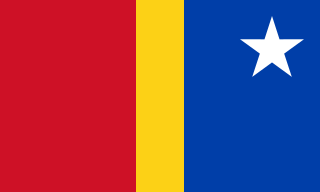| Muhammad Bello | |||||
|---|---|---|---|---|---|
| Sarkin Kano | |||||
| Reign | 1883-1892 | ||||
| Predecessor | Abdullahi | ||||
| |||||
| House | Dabo Dynasty | ||||
| Father | Ibrahim Dabo | ||||
| Mother | Shekkara | ||||
Muhammad Bello ![]() pronunciation was an Emir of Kano who reigned from 1883 to 1892. [1] [2]
pronunciation was an Emir of Kano who reigned from 1883 to 1892. [1] [2]
| Muhammad Bello | |||||
|---|---|---|---|---|---|
| Sarkin Kano | |||||
| Reign | 1883-1892 | ||||
| Predecessor | Abdullahi | ||||
| |||||
| House | Dabo Dynasty | ||||
| Father | Ibrahim Dabo | ||||
| Mother | Shekkara | ||||
Muhammad Bello ![]() pronunciation was an Emir of Kano who reigned from 1883 to 1892. [1] [2]
pronunciation was an Emir of Kano who reigned from 1883 to 1892. [1] [2]
Below is a biography of Muhammad Bello from Palmer's 1908 English translation of the Kano Chronicle . [2]
The 48th Sarki was Mohammed Belo, son of Ibrahim Dabo. His mother was Shekkara. He was a very generous Sarki.
He said to his friend Sarkin Fada Dan Gatuma, "You are Waziri Kano; I place in your hands the management of Kano."
The Sarkin Fada was unrivalled as a settler of disputes. Belo was like his Wazir, and Sarkin Fada was like Sarki. When Sarki Fada died, Mohammed Belo stretched out his legs because he saw that now he must become Sarki in earnest. He expelled the Galadima Ibrahim from his office and banished him to Funkui in Zaria, whence his name, "Galadima na Funkui."
Belo gave the post of Galadima to his son Tukr, and his son Zakari was made San Turaki. Another son Abubakr he made Chiroma in place of Chiroma Musa.
Muhammad Dan Yakubu,pronunciation known as Muhammad Rumfapronunciation was the Sultan of Kano from 1463 until 1499. His reign was characterized by wealth and opulence and signaled the rise of the Sultanate's commercial dominance in the region. Under the guidance of famed Berber Scholar, Muhammad Al-Maghili, he was also responsible for much of the Islamization of Kano. In total, the Kano Chronicle attributed twelve innovations to him including; extending the city walls, building a large palace, the Gidan Rumfa, promoting slaves to governmental positions and establishing the Kurmi Market. Rumfa's reforms also proved to be the catalyst that would propel Kano to its political peak, resulting in the first Kanoan Empire under his grandson Muhammad Kisoki.

Abdullahi BayeropronunciationCBE CMG dan Muhammad Abbas (1881–1953) was Sarki (Emir) of Kano, with headquarters in Kano, Kano State, Nigeria from 1926 to 1953. As a traditional ruler he had extensive powers under the British colonial authority.

Ibrahim Dabopronunciation was the leader of the Fulani Sullubawa in Kano and founder of the eponymous Dabo dynasty. His progeny has lasted over two centuries reigning as Muslim rulers of the ancient city-state of Kano. The dynasty has become synonymous with the ancient city-state in affectionate sayings as "Kano ta Dabo Cigari". They have independently ruled the Kano Emirate from 1819 until the Battle of Kano in 1903 which as a result of British colonisation transformed into the Kano Emirate Council.
Mohammed Tukurpronunciation was the Emir of Kano, a state in what is now Northern Nigeria. Tukur presided over Kano during the Bassasa, a period of civil war that saw multiple claimants to the Kanoan throne.
Muhammad Dan Abdullahi, known as Muhammad Kisoki, was the Sultan of Kano from 1509 until his death in 1565. His 56-year reign is the longest of the state's Rumfawa era.
Abdullahi Dan Kanajeji, known as Abdullahi Burja, was the sixteenth ruler of Kano. Through forging of powerful alliances and the creation of trade routes, Burja shifted the identity of the Kano Sultanate towards trade and commerce, what Kano and its people are known for today. He was the first Hausa King to pay tribute to Bornu which secured an agreement to open trade routes from Gwanja to Bornu. He was also the first King to own camels in Hausaland. By the end of the 15th Century, Kano emerged as one of the most vibrant trading centers in the Sahel. Through trade, the Hausa language and culture was spread throughout the region.
Muhammad Bugaya Dan Tsamiya, known as Bugaya, was a King of Kano who reigned from 1385 - 1390.
Kabe Dan Kumbari, known as Alhaji Kabe, was the thirty-ninth ruler of the Sultanate of Kano, reigning for the ten year period between 1743 and 1753. He was primarily remembered by the Kano Chronicle as a malevolent and ruthless King. It is said that no record can be kept of the number of battles and wars he fought or those fought by the subkingdoms of Kano by his orders, most notably against Gobir. The baleful nature of his reign led to the ousting of the already unpopular bloodline of Muhammad Sharefa.
Warisi was the King of Kano from 1063 to 1095. He was the son of Bagauda and Saju.
Umaru was a Sultan of Kano who reigned from 1410-1421.
Dauda was a Sultan of Kano who reigned from 1421-1438.
Yakufu was a Sultan of Kano who reigned in 1565.
Abubakr Kado was a Sultan of Kano who reigned from 1565-1573.
Soyaki was a Sultan of Kano who reigned in 1652.
Dadi was a Sultan of Kano who reigned from 1670-1703.
Muhammad Sharefa was a Sultan of Kano who reigned from 1703-1731.
Kumbari was a Sultan of Kano who reigned from 1731-1743.
Sulaimanupronunciation was an Emir of Kano who reigned from 1807 to 1819.
Osumanupronunciationpronunciation was an Emir of Kano who reigned from 1846 to 1855.
Abdullahipronunciation was an Emir of Kano who reigned from 1855 to 1883.